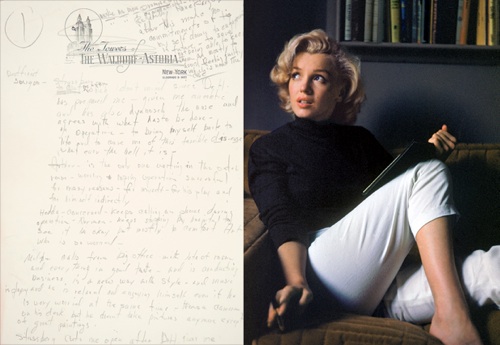Marilyn Monroe and August 5
Marilyn Monroe was found dead in her Los Angeles apartment 49 years ago today, at the young age of 36. A posthumous book of her poetry and writings, Fragments, was published last year, as we mentioned. The Economist wrote at the time:
Monroe was very private with this work, revealing it to only a few friends and intimates. These personal fragments now lend a charming glimpse into her psyche, and also capture some of her pain. At times she shows a real talent for poetry and its rhythm, and uses the disquiet in herself to capture the humanity around her. Arthur Miller, her third and last husband, once said about her: "To have survived she would have had to be either more cynical or even further from reality than she was. Instead she was a poet on a street corner trying to recite to a crowd pulling at her clothes."
Vanity Fair also had a good piece about Monroe and Fragments. It excerpted a poem she wrote about Miller:
my love sleeps besides me—
in the faint light—I see his manly jaw
give way—and the mouth of his
boyhood returns
with a softness softer
its sensitiveness trembling
in stillness
his eyes must have look out
wonderously from the cave of the little
boy—when the things he did not understand—
he forgot
but will he look like this when he is dead
oh unbearable fact inevitable
yet sooner would I rather his love die
than/or him?
In fact, many of her notes were set with line breaks, as if in verse. Vanity Fair wrote of her death:
For those who believe she died of an accidental overdose, mixing prescribed barbiturates with alcohol, the archive contains evidence of her optimism, her feeling that she has come to rely on herself and will solve her problems through work and her capable, businesslike plans for the future.
And for conspiracy theorists who have always suspected foul play, there is an intriguing note to the effect that Marilyn might have distrusted and even feared J.F.K.’s brother-in-law Peter Lawford, who was the last person to speak to her on the phone. In the handsome, green, engraved Italian diary, probably dating to around 1956, she had appended this fearful note to a short list of people she loved and trusted:
the feeling of violence I’ve had lately
about being afraid
of Peter he might
harm me,
poison me, etc.
why—strange look in his eyes—strange
behavior
in fact now I think I know
why he’s been here so long
because I have a need to
be frighten[ed]—and nothing really
in my personal relationships
(and dealings) lately
have been frightening me—except
for him—I felt very uneasy at different
times with him—the real reason
I was afraid of him—is because I believe
him to be homosexual—not in the
way I love & respect and admire [Jack]
who I feel feels I have talent
and wouldn’t be jealous
of me because I wouldn’t
really want to
be mewhereas Peter wants
to be a woman—and
would like to be me—I think
Take a moment, woah. And onward: the Scottish poet Edwin Morgan wrote a poem called "The Death of Marilyn Monroe," as did Sharon Olds. Of course, Frank O'Hara loved Monroe, and Wayne Koestenbaum considers her alongside Adonis in Hotel Theory. You can hear Morgan read his poem below:
http://youtu.be/cbYyHjWR0cE
The New Republic has looked at the biography of Arthur Miller, his relationship to the star, and how it affected his own writing (he didn't write a play for the first seven years of their marriage). Miller was subpoenaed by the House Un-American Activities Committee in 1956:
No sooner was Miller done testifying than he went back to Roxbury, Connecticut, where he lived for much of his adult life, to marry Monroe. On the day of the wedding, June 29, the couple planned to give a press conference, hoping to sate the huge appetite for stories about what one columnist called “America’s foremost foremosts.” On the way home from picking up the marriage license, Miller and Monroe witnessed a car crash: a reporter from Paris Match, following their car, had run into a tree, and the bride and groom watched her die on the roadside. They then continued home, where the assembled reporters went ahead with the press conference. It was an omen of the life to come. As Bigsby puts it, “Miller was being ushered into a new moral universe.”
Then it was off to England, where Monroe was to star with Laurence Olivier in a light comedy called The Prince and the Showgirl. Here the private misery began, as Miller began to fathom Monroe’s bottomless insecurity and paranoia. Certain that the great Olivier held her in contempt, Monroe responded by sabotaging the picture--taking sleeping pills, showing up late, refusing to learn her lines. One scene required thirty takes, “which Olivier called ‘an historic amount.’ ” When Miller tried to point out, reasonably, that Olivier was not really out to get her, Monroe reacted as though her husband had joined the conspiracy against her. The only person she trusted, Miller discovered, was Paula Strasberg, her acting guru, who fed her delusions endlessly. On one occasion, Miller remembered, Strasberg told Marilyn: “You are the greatest woman of your time, the greatest human being of your time; of any time, you name it; you can’t think of anybody, I mean--no, not even Jesus--except you’re more popular.”
What we love is the evolution of Monroe's star identity—sure, she's an icon on a few levels, and her image is wrapped up in mystery (albeit of the magical and problematic sort)—but it's the interiority of her mind, suggested by her connection with poems (or books—have you noticed all the photographs of her reading?) that can also continue to extend and reshape her presence. Thinking of you, MM, on August 5!



